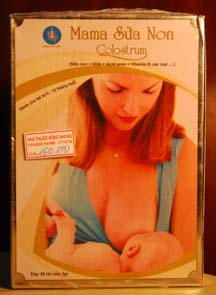EU deadline for DHA, ALA claims
All health claims in Europe are covered by the European Nutrition and Health Claims Regulations (1924/2006) and before being approved must be analysed by the European Food Safety Authority (EFSA) - (Update 41 & Update 42).
In examining the thousands of claims submitted, EFSA has deemed the scientific basis for vast majority of formula claims for Immunofortis, prebiotics etc to be unsubstantiated, but considers that there is evidence to support 4 claims that DHA/ALA contributes to brain and eye development in infants and children. EU Member States (MS) will vote on whether these 4 claims should be permitted at the Standing Committee on Food Chain and Animal Health (SCoFCAH) meeting on 6th December.
While the benefits of Long Chain Polyunsaturated fatty acids (LCPs) in breastmilk are proven, the case for adding synthetic LCPs to the different environment of infant formula has not been, something Nestlé, for one, has finally admitted (pg 15). The case for adding LCPs to follow-on milks, which are part of a mixed diet, and then to make promotional claims is weaker still. We believe that EFSA gave bad advice in this case because it is not required to look at independently-funded research or reviews or to look at ‘risk’ - task that is left to Member States and the EU Commission. So the Cochrane Review, the 98 reports of adverse reactions to the US FDA, the banning of DHA fatty acids in products with the US federal organic label, and the calls for warnings rather than claims, seem to have been ignored.
Since July, responsibility for claims has been transferred from the Food Standards Agency to the Department of Health (DH) who will now attend the EU meetings which take place behind closed doors in Brussels. We have been calling for years for these procedures to be more transparent, accountable and democratic. (See Time to change the Rules?) The DH notes of the meeting are cryptic, but they do indicate that several Member States share our concerns about the lack of evidence to support the claims, how industry will use them and the impact the claims will have on public health messages - not just in the EU but globally. If passed, follow-on milks and any food meeting the criteria could carry these highly promotional claims, further undermining the role of unprocessed family foods. Infant formulas can carry only ‘nutrition’ claims (stating the presence of DHA) not a ‘health’ claim. Illogical when the DH position is that follow-on milks confer no health advantage. Applying ‘Conditions of Use’ guidance would work only if these excluded all foods, milk and drinks for infants and young children.
“The evidence for effectiveness of DHA addition to formula for term babies in terms of improved long-term mental development is weak at best ... until stronger data are available I would opt for a view that the effects of DHA on mental development are not sufficiently documented to establish public health policy.”
Ricardo Uauy. London Sch. of Hygiene & Tropical Medicine. June 2010.
“We find the case for labelling infant formula or follow on formula with health or nutrition claims entirely unsupportable. If an ingredient is unequivocally beneficial as demonstrated by independent review of scientific data it would be unethical to withhold it for commercial reasons. Rather it should be made a required ingredient of infant formula in order to reduce existing risks associated with artificial feeding.”
UK Government’s Scientific Advisory Committee on Nutrition (SACN) 2007
- Green MEP José Bové called for the resignation of Diána Bánáti, Chair of EFSA, because she was a member of the board for the International Life Science Institute, 50% of whose Board members are from industry. The EFSA Board defended her appointment but in order to ‘avoid misperception’ asked her to step down from management positions in any organisations that represent the food industry.
See Policy Blog for links to EFSA’s rejected claims and more.
Whatever next?
 Cow Colostrum for infants. On sale in Vietnam, with DHA claim, supposedly collected within two hours of delivery. Imported from New Zealand.
Cow Colostrum for infants. On sale in Vietnam, with DHA claim, supposedly collected within two hours of delivery. Imported from New Zealand.
Photo: Claire Champion






